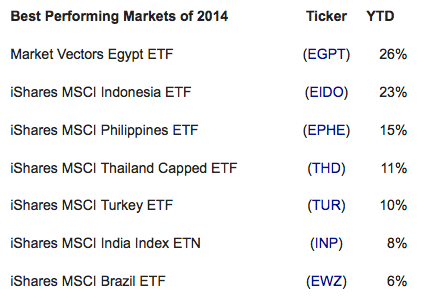The best performing single-country market in 2014 is…Egypt?
Indeed it is, at least based on the performance of the Market Vectors Egypt ETF (EGPT.K), which was up 26% year to date through April 21. Not a bad haul given that the S&P 500 is barely up 2% in 2014 and the Nasdaq Composite is actually in the red.

Nipping at Egypt’s heels is the iShares MSCI Indonesia ETF (EIDO.K), up 23% year to date. The iShares MSCI Philippines ETF (EPHE.K) and iShares MSCI Thailand Capped ETF (ARCA:THD) follow, up 15% and 11%, respectively. And rounding out the top seven are the iShares MSCI Turkey ETF (ARCA:TUR), iShares MSCI India Index ETN (INP) and iShares MSCI Brazil ETF (ARCA:EWZ) with returns of 10%, 8%, and 6%, respectively.
Apart from their great returns this year—and apart from the fact that all can be classified as “emerging markets”—what do these markets have in common?
For lack of better word, all are “scary.”
Let’s start with Egypt. This is the same Egypt that saw the army overthrow and imprison its president last year, sentenced 528 people to death last month in a mass trial, and after next month’s election will almost certainly see a uniformed general—Field Marshal Abdel Fattah el-Sisi –assume the presidency.
Indonesia and the Philippines? The Economist ranks them as 10th and 6th, respectively, in its “Crony Capitalism Index” of corrupt governments. Thailand, Turkey, India and Brazil all make the top 16.
A separate Corruption Perceptions Index compiled by Transparency International has Egypt and Indonesia tied for 114th place out of 175 countries (0 = least corrupt; 175 = most corrupt). And rest assured, the Philippines, Thailand and India all rank in the bottom half.
Turkey—not too long ago considered model democracy for the Muslim world—has now lurched into repression to the absurd point of banning YouTube and Twitter. Thailand has seen violent anti-government protests since November—and off and on for the past decade. India has been backsliding from pro-market reformed and has become hostile to Western investors—though this might change under the expected premiership of Narenda Modi. Brazil may soon have the distinction of botching both the 2014 FIFA World Cup and the 2016 Olympics—preparations for both are woefully behind schedule. And my favorite: Indonesia is also in the midst of a heated presidential election in which one of the candidates is a professional Elvis impersonator.
So…is the key to investment success is to buy garbage?
No, not exactly. But we should tune out the headlines and be willing to tread where other investors aren’t. And right now, that means starting with emerging markets.
Normally, I would use this as an opportunity to extol the virtues of value investing. Yet the Indonesian and Philippine markets are actually quite expensive–and this despite emerging markets in general being exceptionally cheap. Based on data compiled by Meb Faber’s Idea Farm, Indonesia was the most expensive market in the world as of quarter end with a cyclically-adjusted price/earnings ratio (“CAPE”) of 29.00. And the Philippines, with a CAPE of 24.16, is just a hair cheaper than the United States at 25.44. Of this year’s emerging market leaders, only Brazil and Turkey can be considered truly cheap, at CAPEs of 10.12 and 11.52, respectively.
So, what conclusions can we draw from all of this? A value strategy will certainly lead you to potential winners like Brazil and Turkey. But unfortunately, there is really no hard-and-fast rule to identifying in advance a hot market like Indonesia or the Philippines. Based on any value criteria, both would have been avoided.
I wouldn’t recommend investing in Indonesia, the Philippines or Thailand at current prices. Egypt and India might both enjoy “honeymoon” rallies from new political leadership, though I’m not wildly bullish on either. I would, however, recommend allocating to Brazil and Turkey, as both of these emerging markets remain very attractively priced even after their recent runs. When you buy stocks near generational lows in valuations, you give yourself that all-important margin of safety. And when investing in an asset class that features Elvis impersonator presidential candidates, a little extra margin of safety might be a good idea.
Charles Lewis Sizemore, CFA, is the editor of Macro Trend Investor and chief investment officer of the investment firm Sizemore Capital Management.
This article first appeared on InvestorPlace.
